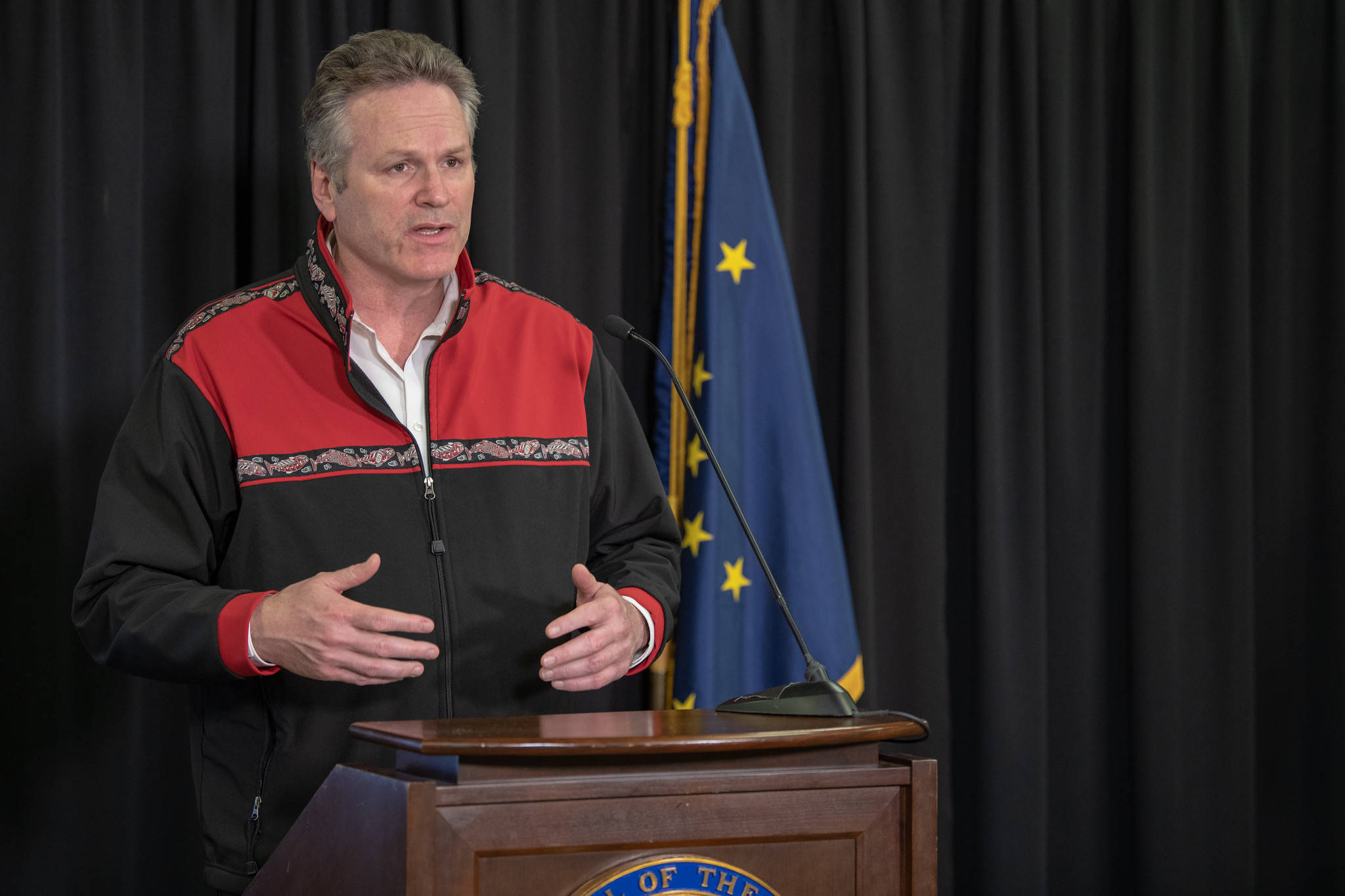Gov. Mike Dunleavy announced his proposal for using the $1.25 billion in federal COVID-19 relief money Thursday at a press conference in Anchorage.
More than $562 million of that CARES Act money will go directly to local municipalities according to documents from the governor’s office, with roughly $53 million coming to Juneau.
“We have $1.25 billion in our hands,” Dunleavy said. “If implemented quickly this gets money in the hands of Alaskans as quickly as possible.”
But lawmakers and the governor don’t agree on who has the authority to control money coming out of the state’s coffers.
The governor has asked the Legislative Budget and Audit Committee to approve his plan through the revised program legislative requests, or the RPL process. Because only the Legislature is allowed to make appropriations, the RPL process allows for the governor to make appropriations to certain pre-existing programs when the Legislature is not in session.
Under state law, the governor has to wait 45 days before he can make appropriations unless LBA approves his plan.
Legislative Legal Affairs Director Megan Wallace cautioned lawmakers that if they were to give the governor appropriation power, it could severely limit the flexibility the state has in how it spends those dollars.
Wallace told the House Finance Committee earlier this month that using the RPL process would severely constrain how and where CARES Act money could be spent.
[Federal money is coming to Alaska, but exactly how it will be used is unclear]
“Each of those proposals will need to be specifically analyzed with respect to the federal funds attached to that purpose,” Wallace wrote in a legal memo. “The administration would have to look at existing appropriations, look at them within the confines of that specific appropriation.”
One of the issues with the RPL process is there are many criteria that need to be met before the process can be approved, according to Rep. Chris Tuck, D-Anchorage, who chairs the LBA committee. One of those provisions, Tuck said, was federal money has to have been already used in that program.
“You can’t just RPL and get federal money into a program that didn’t have federal money in it first,” Tuck said.
The governor’s proposal was currently being reviewed by the Legislative Legal and Finance divisions, Tuck said, which will be presenting an evaluation to lawmakers as soon as possible. Based on that evaluation, LBA could approve whichever RPLs it deems appropriate and then the Legislature would reconvene and appropriate the rest of the funds.
“We want to have enough time to work on this stuff, Tuck said. “There’s still other things that we have to do. There’s other things that we might have to take action on.”
The governor emphasized he wants the CARES Act money to get to people as soon as possible, and that his plan was the most expedient way to do that.
“Congress and the president wanted this money to go to the people as soon as possible,” Dunleavy said. “We’re in the midst of a catastrophe, and their intent was to get this money directly to the people.”
[Federal money comes with lots of strings attached ]
Under the governor’s plan, payments would start going out as soon as May 1.
Those payments would be spread out over several months, with the last payment coming in October. Allocations were made using the Community Assistance formula from the Department of Commerce, according to Dunleavy chief of staff Ben Stevens.
“There’s a lot of uncertainty on what the expenses are going to be,” Stevens said. “This is going to give (communities) some assurance.”
Spreading the payments out was both a way to make sure there will be funds for any unknown future expenses, Stevens said, but also a way of making sure local municipalities are responsible with the money, he said.
However, if LBA does not approve the governor’s plan, that funding formula and payment schedule could be changed. But that change would require an act of the Legislature, which could happen in the coming weeks, according to Tuck.
“This is a pandemic in which expediency is going to be a tool to keep things from collapsing,” Dunleavy said. “We don’t know what this is going to do. We need to hold some money in reserve. This is not a money grab, this is to deal with the actual virus.”

